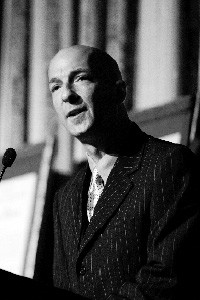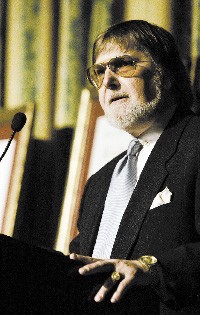On a bright winter Sunday, about 60 people are assembled at the gleaming Hindu Temple in Eads. Some wear saris, some suits, and many are in casual clothes. They are black, white, and brown — men, women, and children. In fact, the only thing they all seem to have in common is that none of them is wearing shoes.
It is Diversity Memphis’ first “Prayers for Peace” event, and attendees have removed their footwear before entering the recently consecrated temple. Statues of lotus-seated deities are draped in flower leis. Bowls of fruit and brightly colored powders sit nearby. The Diversity Memphis group watches as a red-robed priest blesses a small, shy boy in Sanskrit and then gives him a banana.
“We’re going to ask you to sit with someone you don’t know,” says Jim Foreman, Diversity Memphis’ executive director, at the accompanying dinner. He then asks the group to discuss with those at their table how they present their faith to others. When the discussion is opened to the entire room, people identify themselves as Muslims, Jews, Hindus, Presbyterians, Catholics, and Unitarians.
After the local chapter of the National Conference for Community and Justice (NCCJ) closed last year, the future seemed dim for diversity activism. Events such as this one had become unlikely.
Founded in 1927, the NCCJ is a human relations organization with a mission of inclusion. It is dedicated to fighting bias, bigotry, and racism. Though it once had 60 chapters around the country — including an office in Memphis — that number is now less than 20. The Memphis office was closed last August.
That’s when a group of Memphians calling themselves Diversity Memphis decided the mission was worth pursuing.

“We want you to think about how it is to be different in Memphis, Tennessee,” Foreman says. “We want you to think how the world would be different if we all tried a little harder.”
“This type of organization is needed in every community in America,” says Lee Filderman, one of the founders of Diversity Memphis. “The thrust of what we do is to bring people together to focus on the goals we share, rather than focusing on the things that may drive us apart. In Memphis, probably more so than in any other city in America, this is desperately needed, because things are often discussed and resolved along cultural, racial, religious, and ethnic lines.”
Although it’s been almost 40 years since civil rights leader Dr. Martin Luther King Jr. was slain at the Lorraine Motel, Memphis is still a tale of two cities. The community continues to reel from the effects of persistent white flight. The school systems are essentially divided — one majority black, the other majority white.
Diversity Memphis officially began last September but has roots deep in the NCCJ. The local NCCJ chapter started in Memphis over 60 years ago, and it was that organization that originally brought the members of Diversity Memphis together.
“The future certainly looked bright for us locally,” Filderman, also a former president of NCCJ-Memphis, says of the chapter. But a little more than two years ago, things began to change. The national organization announced in the spring of 2004 that it was in financial trouble. In 2000, the national office had more than $22 million in reserves. By 2004, it was down to a little more than $5 million.
“The severity of the organization’s financial situation was a pretty sobering experience,” says Foreman, then the executive director of NCCJ-Memphis. “We were told that it looked like the organization was going to lose another $1 million and that it would be the fifth straight year they had lost a million or more.”
The national office was looking for solutions, but the threat of regional closures loomed large if the cash-flow problem couldn’t be solved.
At the time, the organization operated as a national nonprofit. Regional offices did not have individual bank accounts but paid revenues to the national office. Financial deficits and reserves were tallied annually for each region, but because of the collective nature of the national bank account, those figures were essentially meaningless.
In response to the report, the national organization decided to restructure: Each region would become its own 501(c)(3) with a bank account and a line of credit. But to keep the NCCJ name and status in the organization, each region would have to pay the national office an annual licensing fee.

And there was more. In late 2004, the regional offices received an e-mail from the national president that singled out 24 of the 50 or so regions.
“The letter essentially stated that unless our board members signed an agreement saying that they would be personally responsible if we had a budget shortfall, we would be closed,” says Foreman.
“Most of the major markets in the country were on that list of potential closures. … It felt like we would have a good year, but I wouldn’t have signed an agreement obligating whatever personal wealth I might have had, nor would I ask any board member to do so.”
The board asked Filderman to negotiate on its behalf, but it seemed inevitable that NCCJ would close the Memphis chapter.
“Ultimately, a group of board members started saying, ‘I’m going to leave.’ They were not confident that the national organization was going to survive, and as a result,” says Foreman, “they wanted to ensure that a group in Memphis — which more than most cities needs the work that we do in terms of bringing the population together — continues to exist.”
Other board members struggled with what NCCJ wanted them to commit to doing.
“People said we need to keep the name. Then you have a conversation: Is it worth 8 percent [of revenues] to have a name that may be tarnished in the next year to 18 months?” says Foreman.
As the uncertainties grew, NCCJ-Memphis members also pondered what to do about Camp Anytown, its signature program, an annual youth summer camp.

Until last year, area adolescents had been attending Camp Anytown for two decades. About 40 high school students would spend a week learning about each other and their cultures and about tolerance.
Diversity Memphis executive committee member Tim Malkin calls it the “cornerstone” of NCCJ-Memphis. “For the last eight years, I have spent a week at camp as senior adviser,” he says. “My greatest reward was to see diverse groups of students that don’t speak to each other become a cohesive unit [at camp].”
When Meghan McMahon boarded the Anytown bus in the summer of 2004, she wasn’t excited. She thought that camp would be a everyone-love-one-another hug-fest. Lame. None of her friends were going, but her parents were making her go.
“I didn’t really know what it was,” she says. “I didn’t know what I was going to be doing, and I was afraid everyone else would know each other.” Her shrug is almost audible. “No one really knew each other. Everybody was kind of on their own.”
Once at camp, however, people got to know each other quickly — and very personally — during discussion groups.
“We told each other our life stories,” McMahon says. “It wasn’t cheesy. But you actually got to hear about all these different issues that other people have to face that you didn’t even know existed.”
Katie Pohlman went to camp the summer before McMahon. At the time, she didn’t know what to expect either.
“I knew it would be different,” she says, “but I wasn’t sure it would be good different.” Now she calls it one of the best experiences of her life.
“One morning before breakfast, we were separated into groups by race. During breakfast, we weren’t allowed to talk to anybody who wasn’t in our group,” she says. “It was really hard because we had all become friends.”
Pohlman places an emphasis on the relationships she made at camp. She is still in touch with about half of her fellow campers.
“Going to Anytown is a special bond we share. We all have a weird understanding of each other,” she says.
Pohlman, a University of Tennessee student, applied to be a counselor for the 2005 Anytown, but it didn’t happen. As the group continued to find its footing in early 2005, the national office of NCCJ asked its regions to trim $10,000 in expenses to improve the organization’s cash flow. The request essentially meant Anytown would die.
“Everything we do all year long feeds the programs we do,” says Foreman. “If you take our premier program and say, ‘We need you to save money,’ it leaves an empty feeling. How many people do I want to go back to next year and say, ‘I want you to support us again’? They’ll say, ‘How did camp go last year?’ [And you have to say] ‘Oh, you know, we didn’t do camp.’ For me, it was a defining moment.”
Jamie Griffin was NCCJ-Memphis’ programming vice chair, but after various resignations he found himself interim president of the local chapter. He still wanted to hold Camp Anytown, but the group didn’t have the staff. And they didn’t know enough about what was going to happen — at either the national or local level.
“That hurt me personally,” he says. “All the fund-raising, the Walk As One 5K — it all helps raise money that goes into Anytown. Not having [the camp] was very disappointing.”
They weren’t the only ones who felt that way.
“I was kind of upset,” says Pohlman, the would-be counselor. “I wanted to help people get what I got out of Anytown. I wanted to be part of that.”In July, Foreman resigned. And when the national president visited Memphis later that month to meet with local board members, only two of the remaining 14 showed up. In August, NCCJ-Memphis was closed.
But Diversity Memphis was just beginning.
“After exhausting every avenue to make NCCJ work, I came to the conclusion that it was unworkable,” says Filderman. “In talking with other board members, we agreed we could do things better locally without having to pay a fee to the national office.”
A nine-member executive committee began meeting in August. The first founders’ meeting was held in September at Harish Vishria’s Germantown home.
“It’s not like Memphis is such a wonderful place where everybody gets along with everybody and there are no diversity issues,” says Vishria. “The question was: How do you continue the work? That’s why we started Diversity Memphis.”
The founders — about 40 of whom were at the meeting — ranged from longtime NCCJ members to people who didn’t know the organization existed. Over a diverse buffet of Indian food, bagels and cream cheese, and tortilla chips and salsa, Diversity Memphis approved its new bylaws and discussed possible changes.
“Part of the discussion was what was before and what was after, but mostly it was about what do we see as the issues of the Memphis community? Where do we go from here? Again, with no bearing on where we came from,” says Vishria.
And though Diversity Memphis plans to continue programs it started with NCCJ, members hope to broaden the group’s scope.
“I think the general consensus was that we need to try to get the faith leaders together,” says Vishria. “That was a very critical part. … Those are the people who can influence a lot of other people, and those are the people who are most receptive — or should be — to [Diversity Memphis’ ideals].”
Despite the turmoil, today the transition from NCCJ to Diversity Memphis appears almost seamless.
From its inception, Diversity Memphis has received an outpouring of support, the culmination of which was the group’s first annual Humanitarian Awards dinner, held last week at the Peabody. The dinner honored Jim and Lucia Gilliland, Soulsville Foundation president Deanie Parker, attorney Arnold Perl, and Catholic Charities vice chairman Thomas Scherer. With more than 500 attendees, the dinner grossed over $100,000. Organizers initially expected to raise less than half that amount.
“All this since September,” Filderman said. “We’ve gotten off to a great start, and this is just icing on the cake.”
Support now comes from more than 70 organizations and individuals, including Rabbi Micah Greenstein, Jack Belz, educator Jane Walters, and county mayor A C Wharton. FreeLand, a continuation of the Anytown youth camp (named after the late Flyer editor and NCCJ supporter Dennis Freeland), is scheduled for July. The group has a 5K walk planned for September 17th, as well as plans for a speakers’ series, a women’s conference, and a youth conference with an ongoing Web-based dialogue.
Diversity Memphis and its members seem refocused and reenergized by the challenges of the past two years. Filderman says the ordeal was perhaps a blessing in disguise.
“We’re getting a fresh start,” he says, “hopefully with new and exciting ideas.
“We will have the freedom and the flexibility to tailor events and programs to the specific needs of Memphis and this area. With the old organization, we were somewhat limited by national protocol. If we need to make changes and create new programs at the drop of a hat, we can do that,” says Filderman. “I hope we make Diversity Memphis more relevant than NCCJ ever was.”
It is a hope that many share and one that could potentially impact the city’s future.
“I think that the extent that we are successful will have an impact on Memphis race relations and diversity issues,” says Harish Vishria. “There is no other organization dedicated solely to the purpose of human interaction, race relations, and faith relations.”